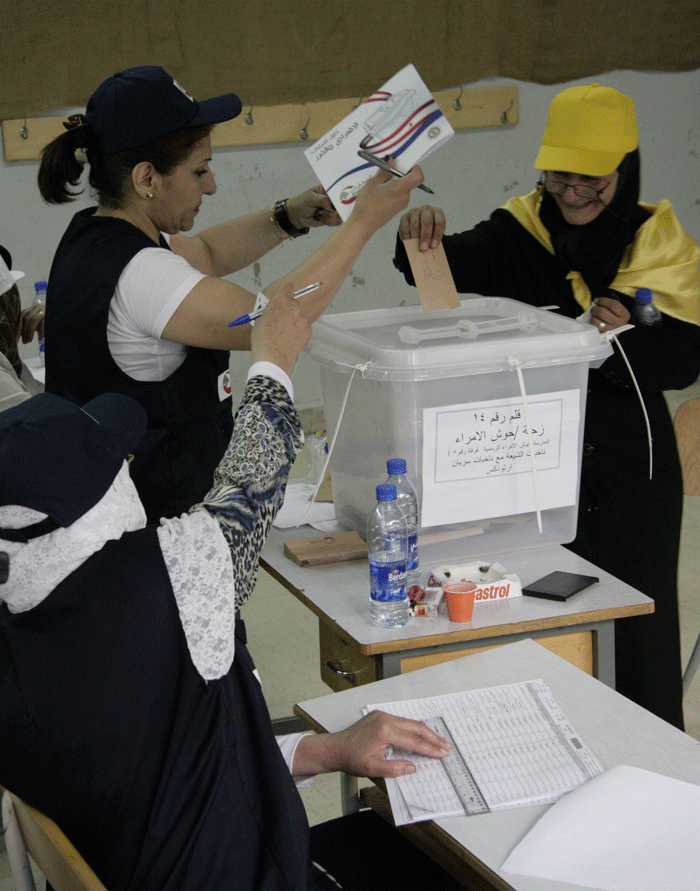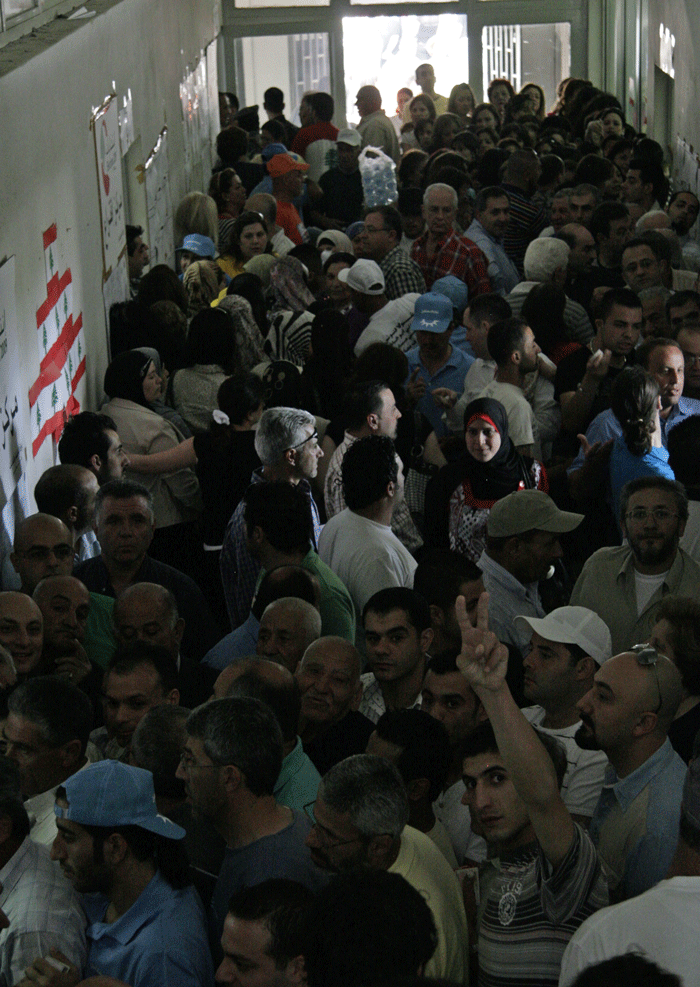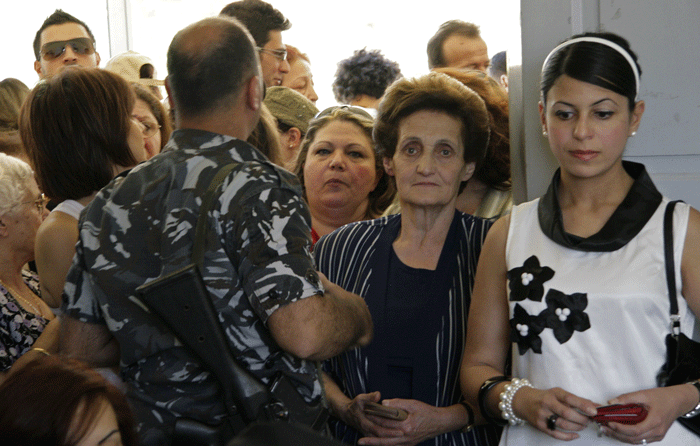Political Perspectives is produced by the students and faculty of Carleton University's School of Journalism and Communication, Canada's oldest journalism school.
22nd
JUN 2009
Twitter patter
Posted by padams under All, Media Commentary
Paul Adams
In its Sunday edition, the New York Times had the best explainer I have seen of the special significance Twitter has had in the recent events in Iran. I would still appreciate a more granular technical explanation of why it is more difficult for a government to block Twitter than, say Facebook, but this story at least alludes to the basic difference between Twitter and other social networks, or old-fashioned email for that matter. It also puts Twitter’s journalistic usefulness in perspective.
The article is worth the substantially more than 140 words the NYT devoted to the topic.
19th
JUN 2009
Libs grip slipping?
Posted by padams under All, Media Commentary, Political Strategy
Paul Adams
The Liberals have enjoyed an edge in the polls throughout the late winter and spring, and that advantage has been even more marked when you project the poll results onto seats, largely because the Liberals have been gaining in Ontario and Quebec since the last election, where every vote may count towards winning more seats, while the Conservatives have been increasing their stranglehold on Alberta and parts of the rural West to no additional advantage, since they already own these regions.
However, the race is tightening.
This morning EKOS Research (with which I have an association) released a new seat projection based on its most recent weekly poll. It shows the Liberals leading with 123 seats, but the Conservatives only a smidgen behind with 111 seats. The NDP have 30 and the Bloc 44.
If you look at the THREEHUNDREDEIGHT website — a site whose name is an homage to the legendary American polling site FiveThirtyEight — which does projections based on a number of polls, they have the race even tighter.
Now, here’s the thing. The Liberals nose-dived on the last night of EKOS‘ weekly poll, which was Tuesday, presumably on the news that the Liberals were prepared to force an election if certain demands weren’t met.
The Liberal-created crisis received huge publicity — in the teasers on The National, for example, and on the front pages of newspapers. The resolution of the crisis on Wednesday received no such attention. It played prominently on the news channels, but if you wanted to watch the story on The National, you had to wait (until after the first commercial break if I recall correctly), and it was buried in the front section of the Globe and Mail.
This could meant that the Liberal loss from the election threat will endure past the resolution of the crisis and the end of the parliamentary session today.
Even if the Liberals do rebound from their slump, it is an indication of how tenuous their grasp is on their current support. Right now it appears to be based more or less exclusively on hostility to Harper and economic uncertainty. We know that some of the higher income groups (which the Liberals have been successful at wooing from the Tories lately) are influenced in their economic perception more by the stock market and broad measures of economic growth. These are the economic indicators most likely to improve first (indeed the stock market has already rebounded very substantially since the beginning of the year).
For many Canadians the real measure of economic recovery, however, will be a falling unemployment rate, which isn’t likely to come for quite a while, and so far the Liberals have not had the traction they need among the economically vulnerable middle and lower classes, and the youth.
If one strong puff of wind can blow the Liberals off their perch, as it did, at least momentarily earlier this week, they do not yet have the grip they need to win in the long run.
This could be a tough summer for the Liberals. The absence of an election allows the Conservatives to use their huge advantage in money and organization. And there are all those infrastructure projects to announce (and re-announce and re-announce). This forces a strategic dilemma on the Liberals: do they respond with short-term expenditures on advertising, for example, to meet the challenge? If they do so, it will slow down their efforts to re-invest in their fund-raising and organization — crucial elements in their longer term success.
Canadians may not have wanted an election this summer, but they are going to get a campaign anyway, and it is one in which the government party has a definite edge.
Paul Adams teaches journalism at Carleton. He is also executive director of EKOS Research Associates.
17th
JUN 2009
Harvey Cashore on lawsuit chill
Posted by padams under All, Media Commentary
Paul Adams
Check out this You Tube clip of the fifth estate’s Harvey Cashore discussing the effect of lawsuits on the the Airbus story.
Thanks to Paul Hunter for drawing my attention to this clip.
16th
JUN 2009
Stéphane Dion, Bugs Bunny, and a dead cat
Posted by padams under All, Election 2008, Election 2008 Media commentary, Media Commentary, Political Strategy
Paul Adams
A small, but significant corrective to Andrew Cohen’s column in today’s Ottawa Citizen.
I sympathize with Cohen’s view that CTV, and in particular, Mike Duffy, gave Stéphane Dion shabby treatment when they aired his repeated false starts in an interview just five days before last October’s election.
The Canadian Broadcast Standards Council recently criticized CTV for breaching the industry’s code of conduct for airing the false starts even after it had told Dion that it would not. (CTV has strongly defended its decisions in the incident.)
However, is it also true, as Prof. Cohen argues, that for Dion’s campaign, the broadcast may have been “decisive”? His argument appears to be based on a misreading of the polling data.
“It was late in the campaign and polls suggested the Liberals were gaining on the Conservatives,” he writes. And later: “Last October, the polls suggested the Liberal Party’s ascent stalled after the interview. While we cannot say if Dion’s momentum would have brought his party victory, it isn’t impossible.”
Well, almost anything can happen in an animated cartoon, as Bugs Bunny trenchantly observed. But the idea that Dion was riding some “momentum” that might have carried him to victory until the release of the interviews is mistaken. The evidence of the polls is not what Prof. Cohen suggests.
The daily tracking polls that appeared in the last campaign all used a variation of the “rolling poll” system, whereby a published poll includes three, or in some cases four, nightly samples rolled into a single number. Each day, the oldest day is dropped and a new day is added. That means that the published numbers are to a degree retrospective. A number published Thursday, for example, would normally include samples from Monday to Wednesday, or even Sunday to Wednesday.
In other words, there is a delay between moves in public opinion and their capture in the polls. Moreover, I would say from my general observation that it takes two or three days after that for the media to internalize the news of significant shifts contained in the polls and incorporate it into their narratives of the campaign.
At the time of the CTV release of the Dion interviews, there was certainly a media perception that the Liberals were gaining, but this was old news. In fact, all the tracking polls had begun to show the Liberals dipping once again by then.
Mr. Dion had been fairly effective in the leaders’ debates the previous week. The Liberals did indeed get a bump in the polls in the days afterwards, running through the weekend. However, once the last full week of the campaign began, the Liberals slumped back to the dismal numbers they had suffered mid-campaign and which they carried through to election day.
I remember tearing my hair out the very morning of the day the Dion tapes were aired when I saw a headline on the CBC morning program trumpeting the Liberal revival. The revival had been over for several days, and by that time a careful reading of the polls made that evident, notwithstanding the inevitable delay created by the rolling poll system. The problem was, if I may be allowed a gratuitous comment on the media, that the “tightening race” narrative was a better story, and only reluctantly shucked off.
You can check the daily tracking numbers for yourself here.
In fact what had happened was something different.
The Liberal bump after the debates was a dead-cat bounce which was already over by the time of the infamous interview.
The CTV-Dion incident might have been the last nail in the coffin. It may rightfully be described as a final ignominy.
But decisive, it was not.
Paul Adams teaches journalism at Carleton. He is also executive director of EKOS Research Associates, a polling firm that published a daily-tracking poll in the last campaign.
15th
JUN 2009
Deciding in an uncertain world
Posted by ealboim under All
Elly Alboim
Some decisions are fiscal, others are moral. And some contain elements of both. The balancing act can say a lot about values and priorities.
It is undeniable that after 15 years of work and money, the MAPLE reactors were not working as predicted and that any fix was uncertain and bound to be costly.
But it is also true that Canada’s pre-eminence in the medical isotope field rested on its initial invention of isotopes and in its promise to the world that it would invest in the next generation of reactors to produce them. We reaped financial benefits and maintained a continuing presence in leading edge technology. As a result, no one else did anything to ensure that sufficient new facilities were built and ready to come on line after the forecast useful life of the world’s current crop of 50 year old reactors ended.
The Harper government decided 20 months ago that it would no longer invest in getting the MAPLEs to work.
Its Plan B? Gamble that the NRU reactor would continue to work, carrying more than 50% of the global burden, could be relicensed until 2015, and assume someone else would take up the job after that. In essence, giving the world an eight year heads up.
Like many gambles, this one has come up short and likely will continue to do so.
As a country our fiscal liability is now reduced. Our moral liability to future patients and world partners seemed less a part of the decision making equation.
Elly Alboim is an associate professor in the School of Journalism and Communications and a principal in the Earnscliffe Strategy Group, specializing in strategic communications and public opinion. He also consulted last year for MDS Nordion — the company that initially invested in the MAPLE reactors and is now suing the Canadian government and AECL.
11th
JUN 2009
Stories that tell a broader tale
Posted by cwaddell under All, Media Commentary
Christopher Waddell
There are a couple of very good and important stories out there at the moment that haven’t received the amount of public and media attention they deserve which in the process highlights two disturbing trends in the media.
One story is the National Post’s pursuit of police doing secret and illegal records checks for Crown attorneys of potential jurors in criminal cases to try to stack juries to ensure convictions. The Post exposed this in Barrie, Ont. initially and now has broadened the story to reveal the same practice occurring in at least Windsor and Thunder Bay.
The other one is the CBC’s work on the untendered contracts awarded by eHealth Ontario and the compensation given senior management. Related to that are serious questions about why Ontario is lagging so far behind other provinces in the move to electronic health records.
In both cases the news organizations did several stories before other news organizations picked up and pursued the issue. Even now the others are playing the issue lower down than the CBC or the Post. Over the last few years the media collectively has abandoned the practice of trying to advance a story that a competitor breaks first. Now they are more likely than not to ignore it. The more reporters and news organizations are competing to advance a story the better informed the public will be. Without that chasing, governments are getting a free pass on the sort of accountability that should be the cornerstone of the media.
Related to that, these two stories show the degree to which the media in general has abandoned covering public policy at the provincial level. The Globe and Mail’s decision several months ago to eliminate its Queen’s Park column was the latest sign that increasingly there is no scrutiny by news organizations of what provincial governments are doing. The public loses here too.
Christopher Waddell is associate director of the School of Journalism and Communication at Carleton University. He is a former reporter, Ottawa bureau chief, national editor and associate editor of the Globe and Mail and a former CBC-TV parliamentary bureau chief and executive producer-news specials for CBC TV News.
8th
JUN 2009
Does any of this make sense?
Posted by ealboim under All, Media Commentary, Political Strategy
Elly Alboim
I’m afraid not.
First, there’s the scavenger hunt. Lisa Raitt’s aide loses her tape recorder in February and allegedly never asks for it back, despite the reporter’s claim that he offered to return it. Then months later, presumably more alert now, she leaves a briefing book behind and doesn’t claim it either. Is this normal behaviour for an aide in the most secretive government we’ve had in memory?
In both cases, the reporters wait to report on what they have. In CTV’s case, they wait a week. In the Halifax Chronicle Herald case, they wait months and claim not to even have bothered listening to it until the briefing book affair. Does this sound like the competitive journalism that has led to the breathless scandal-chasing we’ve come see as normal in Ottawa?
Then the unemployed aide goes to court to get an injunction and everyone in government and the Conservative Party who is asked, claims not to have funded the process and not to be involved in any other way. The attempt at prior restraint fails as every other such attempt has and the story gets wider exposure as a result. And now a dying story without “legs” has become the Eveready bunny. Is this competent crisis management from the allegedly strategic political machine currently in power?
None of it makes any sense or stands up to scrutiny. It is baffling.
Elly Alboim is an associate professor of journalism and a strategic communications consultant at the Earnscliffe Strategy Group. He was CBC TV’s Parliamentary Bureau Chief for 16 years during which time he thought he’d seen just about all there was to see on the Hill. He was wrong.
8th
A Lebanese election day
Posted by padams under All, Political Strategy
Paul Adams
Zahle, Lebanon
E-day was long and exciting. Unexpectedly high turnout and overly large polls produced very long lines to vote in Zahle, the hotly contested city in the Bekaa Valley where I was stationed. The problem was especially serious in women’s polls. (In Lebanon, most people vote in gender-specific polls, and most also in “confession”-only polls, i.e. Sunnis vote with Sunnis, and Greek Orthodox with Greek Orthodox, etc..)
We say plenty of verbal aggression and pushing and shoving, but no real violence. I retuned to my hotel at 1 a.m. after going to the court of revision, but was kept up until 3 a.m. with all the celebratory gunfire though.
Some of the voters we saw waited as long as 4 hours to vote. Women’s polls were especially problematic.
A minister draws a crowd when visiting an especially chaotic polling station in a village near Zahle.
Hezbollah party agents “scrutineer” the voting process.
A Hezbollah voter wearing party colours.
Paul Adams teaches journalism at Carleton and in is Lebanon this week as an election observer with the National Democratic Institute for International Affairs (NDI).
6th
JUN 2009
Election eve
Posted by padams under All, Political Strategy
Paul Adams
Zahle, Bekaa Valley, Lebanon
Dozens of cars carrying supporters of the Lebanese Forces — a Christian party — paraded their colours on election eve on the street in front of our hotel.
And then…
…dozens of these vehicles rumbled by after them…
Paul Adams teaches journalism at Carleton and in is Lebanon this week as an election observer with the National Democratic Institute for International Affairs (NDI).
6th
The ads
Posted by padams under All, Political Strategy
Paul Adams
Zahle, Bekaa Valley, Lebanon

Lebanon's notoriously unreliable state-owned electricity utility has led to a proliferation of local grids. State corruption has been a target of General Michel Aoun's Free Patriotic Movement, which has also distinguished itself with a flashy ad campaign. This ad is aimed at young Christians

Since Ottoman times, the Skaff family has been among the most dominant in the Bekaa Valley. The Skaffs are now aligned with the March 8 coalition, which includes Hezbollah along with General Aoun's mainly-Christian party. The city of Zahle in the middle of the Bekaa is itself mainly Christian and the competition for votes here is fierce. In the background, you can see the cedar logo of the Lebanese Forces, a Christian party that backs the March 14 coalition.
Recent Posts:
- 04 May 2011 Twitter and elections: ta...
- 04 May 2011 The Conservative fork in ...
- 03 May 2011 Ignatieff’s pre-mat...
- 03 May 2011 Final Observations
- 30 Apr 2011 Counting up the newspaper...
- 29 Apr 2011 Seat projections…do...
- 27 Apr 2011 Royals versus politicians...
- 27 Apr 2011 Outing a Tory dirty trick...
- 26 Apr 2011 Those advance polls
- 26 Apr 2011 The trouble with Liberals...
Categories:
- All (93)
- Election 2008 (117)
- Election 2008 Campaign strategy (46)
- Election 2008 Faculty links (12)
- Election 2008 Media commentary (51)
- Election 2008 Student articles (37)
- Election 2011 (53)
- Election 2011 Campaign strategy (45)
- Election 2011 Faculty links (38)
- Election 2011 Media commentary (36)
- Election 2011 Student articles (1)
- Media Commentary (48)
- Political Strategy (50)
- Post-election (3)
- Uncategorized (1)
Archives:
- May 2011
- April 2011
- March 2011
- March 2010
- February 2010
- January 2010
- December 2009
- November 2009
- October 2009
- September 2009
- July 2009
- June 2009
- May 2009
- April 2009
- October 2008
- September 2008










 RSS Feed
RSS Feed